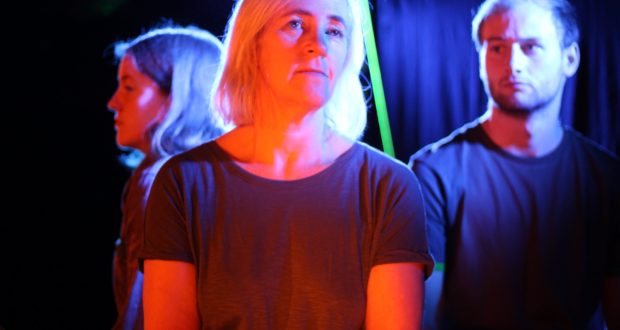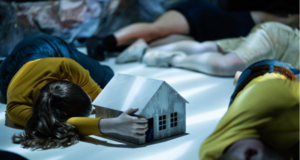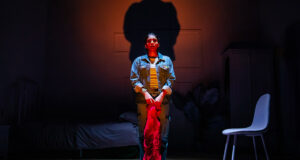Pros: The sing-along moment that shows in practical terms the process of dopamine release that the play is all about.
Cons: With its hour-long running time, this lively show left me wanting more. Live music and spoken word shed light on the mechanisms of addiction that affect our brains. Informative and entertaining.
Summary
Rating
Excellent
When we do something we like, our system produces dopamine, a substance that – as they illustrated by having us sing along during the performance – ‘rewards your brain and numbs your pain, provides the feeling you adore and keeps you coming back for more’.
Fix is a play about the processes that make us crave that sense of pleasure we often receive from harmful things. It is, essentially, a play about addiction, the difficulties of cutting free from it and the damage that it causes to our private and social lives.
Worklight Theatre company spent two years researching this topic and chatting with a range of people who are, in different ways, related to addiction. As a result, they devised three imaginary characters, who sum up and merge several true stories they collected along the way.
Zach (Finlay Cormack) has a gambling problem but, since he became father, has given it up for the sake of his baby daughter, his willpower winning over the luring promise of a win. The mechanism used by betting shops and casinos, though, works with images and colours to produce subconscious reactions, so the danger of falling back into habit is always around the corner.
Maggie (Fiona Whitelaw) is in her fifties and has spent most of her married life fighting her husband’s sex addiction. He likes to watch the ladies on live webcam but, technically, this can’t be considered cheating and she feels she has a duty to stay by his side and try to help, despite his continuous lies.
Robyn (Rianna Dearden) is a social worker who offers assistance to recovering addicts and their families. She’s also a human being and, sometimes, she thinks she has chosen the wrong job. Continuously dealing with desperate cases and often being unable to suggest a proper solution to their problems, can really feel like a losing game.
During an hour we follow their uncertain path, wondering whether they’ll find a purpose in what they do and come out unscathed on the other side of the tunnel. Surrounded by a web of fluorescent strings, their accounts alternate with moments of live music and multi-chromatic bright lighting. Between the pages of our programme there is a yellow sheet, with the lyrics of a song about dopamine, and we’re all invited to join in with the singers, who explain that actions like sharing a song make our brains subconsciously bond.
Fix is a cute and well-informed performance about a widespread, and often overlooked, drama. Lively and entertaining, it could easily be adapted to a longer piece and – perhaps victim of an undetected addictive trigger – I left the Belly Dancer auditorium craving more.
Authors: Joe Sellman-Leava and Michael Woodman
Director: Katharina Reinthaller
Producer: Worklight Theatre
Box Office: 03333 444167
Booking Link: https://tickets.edfringe.com/whats-on/fix
Booking Until: 27 August 2017
 Everything Theatre Reviews, interviews and news for theatre lovers, London and beyond
Everything Theatre Reviews, interviews and news for theatre lovers, London and beyond



